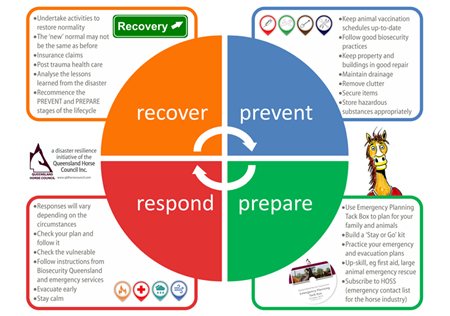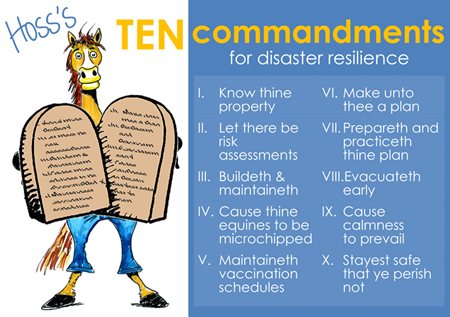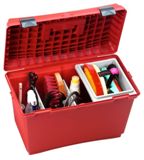Emergency Planning
When it comes to extreme weather events in Queensland or the possibility of an emergency animal disease outbreak, it’s not so much a matter of ‘if’ but ‘when’.
One of the QHC’s functions is to assist the horse industry to prepare for the unexpected. When horse owners and event organisers are able to respond quickly and effectively to an emergency it reduces the impact and stress of the emergency itself and assists us to recover more rapidly.
The four-stage life cycle of disasters.
Understanding this helps us to be prepared for disasters, respond safely and recover quickly and effectively.
At each stage there are different things to know, different actions we should take and different ways we connect with people. These stages can change rapidly and often overlap.

The four stages are:
Prevention activities reduce the impact of natural disasters and disease outbreaks through the identification of risk. Such prevention measures can include maintaining appropriate vaccination schedules, good biosecurity practices on farm and at events and property design.
Preparedness is an ongoing set of activities in which people plan, prepare/organise and train for emergency situations. This includes tasks such as having a stay/go kit, making an evacuation plan, simulating disaster situations and appropriate responses, and discussing emergency preparedness with your family, friends and neighbours.
Response is responding to the immediate needs of the emergency situation. A well rehearsed emergency plan developed during the preparedness stage enables more effective responses at all levels.
Recovery involves activities and decision making necessary to restoring the affected area to its previous state or better.
The severity of a disaster is determined by both the scale of the disaster and the level of community preparedness.
As Queensland’s horse community is vulnerable to a variety natural disasters and potential disease outbreaks, our resilience is critical to minimising the effect of these emergencies and to contributing to a faster and more effective response and recovery.

Dealing with floods: watch the following presenation on dealing with floods and our strategies to help improve the resilience of Queensland's horse industry.
Disaster resilience doesn’t happen by accident, so what can you do in the good times to make sure you’re ready when disaster strikes?
 At a personal level you can:
At a personal level you can:
 As a venue owner or event organiser you can also:
As a venue owner or event organiser you can also:
 At an industry level we:
At an industry level we:
-
Have prepared an industry Emergency Response Plan which is regularly reviewed for relevance and effectiveness.
-
Have developed and implemented an emergency warning email database for Queenslanders called HOSS (Horse Owners Signal System).
-
Have implemented a training program in conjunction with Animal Health Australia for Industry Liaison Officers (ILOs) to assist with emergency response.
-
Are developing an ILO network for trained ILOs.
-
Are continuing to promote and encourage horse owners, venue operators and event organisers to develop their own emergency plans.
Please take a few moments to use the planning Tack Boxes provided to develop your own plan, you never know when you might need it!